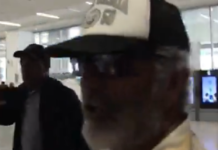The Biden-Harris administration permitted a Venezuelan migrant and his family to enter the streets of Eagle Pass after they utilized the CBP One mobile application to gain entry into the United States. The migrants reported that they were not questioned about their asylum claims or credible fear prior to their release.
Rodrigo, a Venezuelan citizen who preferred to remain anonymous, and his family wandered the streets of Eagle Pass on Thursday night in search of accommodation. After failing to locate any available migrant shelters and lacking financial resources, Rodrigo was left to find a suitable place for his children to rest. Having just entered the United States earlier that day, he indicated that he was not required to declare asylum to Customs and Border Protection (CBP) officers at the port of entry or to respond to any asylum-related inquiries to gain entry through the Biden-Harris CBP One initiative.
Rodrigo’s wife was visibly distressed as the family traversed the streets, hoping to secure shelter. The family of four, which included Rodrigo’s 14-year-old daughter and seven-year-old son, had walked nearly five miles throughout the city. With no funds for food or lodging, they had resigned themselves to seeking an open convenience store where the children could rest while Rodrigo kept watch over them.
The family more than four miles from the Eagle Pass Camino Real Port of Entry, where they had been admitted into the United States and released under the Biden-Harris CBP One asylum program over eight hours earlier. Rodrigo mentioned that the family had waited for a CBP One appointment in Mexico for two months, during which they made numerous attempts on the smartphone application in hopes of securing one of the 1,450 daily appointment slots that facilitate migrant entry into the United States.
This program allows migrants to enter the United States without undergoing a formal credible fear hearing with an asylum officer. Instead of providing justification for their asylum request, Rodrigo briefly recounted his experience. When inquired whether he was obligated to provide a verbal asylum claim during his admission processing or to explain to CBP officers the reasons for leaving his country or the fears he harbored, Rodrigo responded, “No, they didn’t interview us like that.”
Rodrigo indicated that he financed his journey from southern Mexico and did not utilize the newly established Secure Emerging Mobility Corridor busing program, which offers complimentary travel, meals, and security for individuals with a CBP One appointment at one of eight land ports of entry along the southwestern border. This initiative was launched by the Mexican government following a series of bilateral discussions between the AMLO administration and the Biden-Harris administration, which broadened the geographical reach of the CBP One application to southern Mexico.
The CBP One smartphone application operates independently from the recently reinstated program for Cuban, Haitian, Nicaraguan, and Venezuelan migrants, which permits up to 1,000 migrants to enter the United States by air each day. Collectively, these two Biden-Harris initiatives facilitate the entry of over 800,000 migrants into the United States annually, ostensibly to pursue asylum claims or under parole status.






